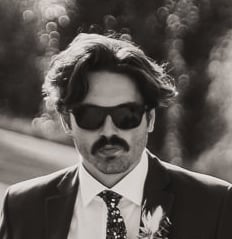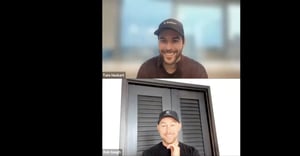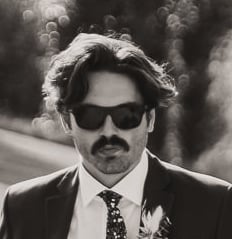In January 2021, Rob Gough broke the record for most expensive trading card ever bought. We were in the midst of the pandemic and the market for all collectables was exploding. Like many others with their newfound boredom, Rob’s passion for buying/selling/trading cards was reignited.
After careful consideration and deliberation with experts, Rob decided to pull the trigger and spend a record-breaking $5.2 million on a 1952 Mickey Mantle #311 PSA Mint 9 rookie card.
This story intrigued us so naturally we wanted to learn more. Who is Rob? Where does he come from? And how can he afford such an expensive hobby?
Hearing his story about the card from the surface level to then getting the chance to pick Rob’s brain and hear his story was not only interesting—but informative and fun.
Rob was the perfect subject for the Iceberg Principle and we’re excited to share what we learned:
Stay positive and take risks
Rob embodies all of ZayZoon’s core values—Trust, Mastery and he’s People Driven but the one that sticks out the most is probably Hustle. Rob is a hustler through and through and works very hard at the tasks in front of him. Starting in middle school, Rob used to buy and sell Airheads out of his locker. It was here that he developed a passion for entrepreneurism and making his own money.
After graduating from high school, Rob spent a few months studying before being diagnosed with a rare form of bone cancer. He had about a 50/50 chance of survival but with the help of his mother, Rob was able to stay positive, fight through chemo and return to school 17 months later. The positivity this instilled in Rob would continue to help him both personally and professionally.
While finishing up his time in school, Rob has his first big business idea: Bidaroo.
The concept was pretty simple—offer brand new products for 90% less than their retail price. He made this possible through gamifying, making the first-ever unique bid auction site.
How did it work? Rob would take something like a flatscreen TV that would normally retail for $1000 and set the Bidaroo price at something like $100. Users would then pay $10 a bid and whoever had the highest unique bid would win the product for the Bidaroo price.
Grandfather’s advice
After graduating from school and success from Bidaroo, Rob was feeling pretty confident about his entrepreneurial efforts but still decided to take some very important advice from his grandfather. His grandfather, who played a significant role in helping Rob get to this point in his life told him, “Work for someone else for three years before you work for yourself.” So instead of pursuing other business endeavors on his own, he went to work for a nationwide clothing and shoe retailer, Finish Line.
Rob really enjoyed his time at Finish Line where he developed meaningful relationships and learned valuable lessons. Although he had the drive, Rob lacked a lot of the hard skills and experiences of corporate life. During his time there, Rob worked hard to climb the ranks and soak in as much knowledge as possible, learning the importance of proper processes, how to actually use a spreadsheet and all that fun stuff. It was also during this time that Rob developed the relationships and helped set the foundation for his first big idea, Eckim, an affiliate marketing company that worked with brands like Home Depot, Macy’s and 1-800-Flowers. With the help of his partner, Rob started and then sold Eckim to Coupons.com, all within three years.
After that, he took a brief hiatus and enjoyed the retired life for a few years—all at the tender age of 29.
Embracing curiosity and challenges
After spending a few years hanging out around California and honing in on his acting skills, Rob started to get the itch again. If he wanted to simply make more money, Rob says he would have gone back into tech and worked on scaling and selling companies—but he wanted more of a challenge.
In 2017, he bought the streetwear brand Dope, with aspirations of turning it into a marijuana brand. The transition from tech to streetwear was hard, instead of having one product to focus on and grow, he now had to create six collections a year, each one unique to the last. “It’s like working on six brands at once” Rob says.
These were the challenges that Rob was looking for but he ultimately decided that the clothing side of things wasn’t for him and started to look for someone to sell that portion of the business to, while still retaining the main name and trademark.
The same curiosity that pushed Rob into streetwear reemerged early on in the pandemic when he rediscovered his love for trading cards and sports memorabilia. A friend reached out to Rob to talk about the current sports card boom caused by the pandemic. Although slightly reluctant about this new “craze” he hopped on a Zoom call to talk with some friends about what was going on. Rob was now very intrigued.
He spent $100,000 on a diversified box of trading cards and after getting them in his hands and feeling them in person, the excitement he felt as a seven-year-old instantly came back and he was hooked.
Then Rob really got to work. With a newfound hobby and some extra spare time caused by COVID, he went deep into research and continued to expand his collection—spending over $1 million in his first month.
While collecting cards and still looking for a buyer to purchase the rights to the clothing side of Dope, Rob had an idea.
In the current state of trading cards, everyone was all in on basketball but Rob predicted that America's pastime would quickly be catching up. He had seen cards like the Micheal Jordan rookie card shoot up in value, while baseball cards, despite their rich history and ties to American culture, increased at a much more conservative rate.
According to his estimates, the previous sale of the Mickey Mantle rookie card worth well over $1 million was actually undervalued, so he decided to put out an offer. His logic was this:
He could spend $5 million on a Super Bowl ad to help sell Dope, or he could spend $5 million on a baseball card. He knew with the current explosion of trading cards, this purchase would get him a lot of exposure which he could utilize to sell the company. On top of that, he got a physical asset to actually hold in his hands.
Being Dope
Hearing Rob’s unique perspective and seeing his unconventional approach to business was both inspiring and refreshing. Rob’s ability to see things others can’t, take major risks and continuously stay positive is a page we should all try to take out of his book.
And that's what our Iceberg Principle is all about. Oftentimes you read outlandish headlines like “Mickey Mantle rookie card sells for a record $5.2 million” but it’s rare to actually get to hear from the people behind them—breaking their decisions down and picking their brains.
We really enjoyed our first three Icebergs of the year and we’re excited to ask even more questions in the new year. The goal was to bring on exciting guests with interesting stories to engage in meaningful conversations and we hope you appreciate the result.
Full recording:
If you missed Polina, Cole or Rob, don't worry—we look forward to bringing you even more fascinating guests in 2024!
Learn more and register here.







